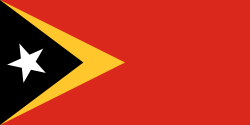Acts
Acting under Chapter VII of the United Nations Charter, the Council authorised the establishment of UNTAET which would have full responsibility for the administration of East Timor and control of the executive, legislative and the administration of justice. [2] UNTAET would also maintain law and order, assist in the development of the civil services, facilitate the delivery of humanitarian assistance, support capacity-building and establish an effective administration and conditions for sustainable development. [3] The main components of UNTAET would consist of:
- (a) a governance and public administration component including 1,640 police;
- (b) a humanitarian component;
- (c) a military component with 8,950 troops and 200 military observers.
Additionally, UNTAET was authorised to take all necessary measures to fulfill its mandate. The Secretary-General Kofi Annan was to appoint a Special Representative to head the operation and who would have the power to make new laws and suspend or repeal existing ones. [4]
The Council stressed the need for co-operation between UNTAET, INTERFET and the local population with a view to the establishment of an independent human rights institution among others. INTERFET would also be replaced by the military component of UNTAET. [5] There was a need for humanitarian and reconstruction assistance, including the issue of refugees and displaced persons resettling in either West Timor or East Timor, and acts of violence were condemned. The Secretary-General was to establish a Trust Fund to finance international assistance, and was requested to provide regular updates on all aspects of the situation in East Timor.
